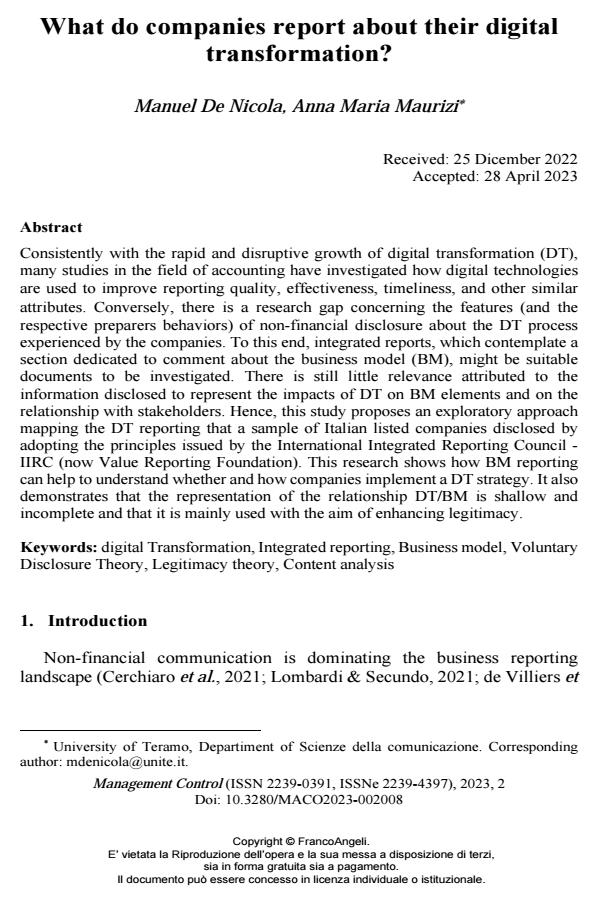What do companies report about their digital transformation?
Titolo Rivista MANAGEMENT CONTROL
Autori/Curatori Manuel De Nicola, Anna Maria Maurizi
Anno di pubblicazione 2023 Fascicolo 2023/2
Lingua Inglese Numero pagine 21 P. 165-185 Dimensione file 247 KB
DOI 10.3280/MACO2023-002008
Il DOI è il codice a barre della proprietà intellettuale: per saperne di più
clicca qui
Qui sotto puoi vedere in anteprima la prima pagina di questo articolo.
Se questo articolo ti interessa, lo puoi acquistare (e scaricare in formato pdf) seguendo le facili indicazioni per acquistare il download credit. Acquista Download Credits per scaricare questo Articolo in formato PDF

FrancoAngeli è membro della Publishers International Linking Association, Inc (PILA), associazione indipendente e non profit per facilitare (attraverso i servizi tecnologici implementati da CrossRef.org) l’accesso degli studiosi ai contenuti digitali nelle pubblicazioni professionali e scientifiche.
Consistently with the rapid and disruptive growth of digital transformation (DT), many studies in the field of accounting have investigated how digital technologies are used to improve reporting quality, effectiveness, timeliness, and other similar attributes. Conversely, there is a research gap concerning the features (and the respective preparers behaviors) of non-financial disclosure about the DT process experienced by the companies. To this end, integrated reports, which contemplate a section dedicated to comment about the business model (BM), might be suitable documents to be investigated. There is still little relevance attributed to the information disclosed to represent the impacts of DT on BM elements and on the relationship with stakeholders. Hence, this study proposes an exploratory approach mapping the DT reporting that a sample of Italian listed companies disclosed by adopting the principles issued by the International Integrated Reporting Council - IIRC (now Value Reporting Foundation). This research shows how BM reporting can help to understand whether and how companies implement a DT strategy. It also demonstrates that the representation of the relationship DT/BM is shallow and incomplete and that it is mainly used with the aim of enhancing legitimacy.
Parole chiave:digital Transformation, Integrated reporting, Business model, Voluntary Disclosure Theory, Legitimacy theory, Content analysis
- Gli effetti della pandemia da COVID-19 sulla disclosure aziendale. Un'analisi empirica nella prospettiva dell'Integrated Reporting Filippo Vitolla, Vitiana L’Abate, Nicola Raimo, Arcangelo Marrone, in MANAGEMENT CONTROL 1/2024 pp.155
DOI: 10.3280/MACO2024-001008 - Cost analysis for telemedicine services: A scoping review of literature on the cost-benefit approach Luca Del Bene, Cecilia Menegon, in MANAGEMENT CONTROL 3/2026 pp.137
DOI: 10.3280/MACO2025-003007
Manuel De Nicola, Anna Maria Maurizi, What do companies report about their digital transformation? in "MANAGEMENT CONTROL" 2/2023, pp 165-185, DOI: 10.3280/MACO2023-002008